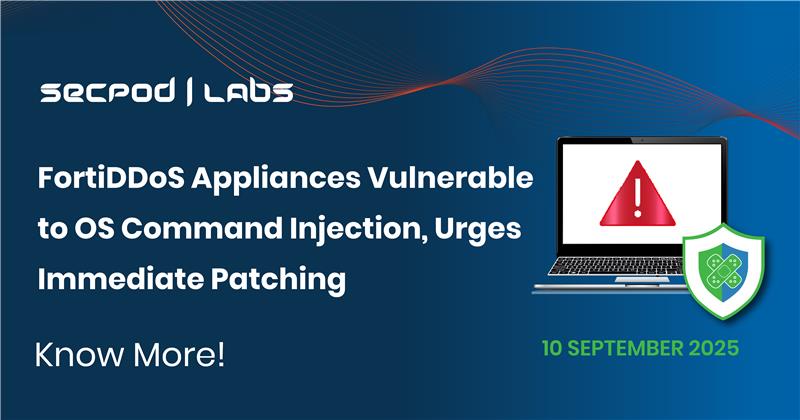Fortinet has recently addressed a medium-severity OS command injection vulnerability, CVE-2024-45325, in its FortiDDoS-F appliances. This flaw could allow a privileged attacker to execute unauthorized commands via the command-line interface (CLI). Given the critical role FortiDDoS-F appliances play in protecting organizations from distributed denial-of-service (DDoS) attacks, this vulnerability poses a significant risk.
Vulnerability Details
The vulnerability, tracked as CVE-2024-45325, stems from improper neutralization of special elements used in OS commands, classified under Common Weakness Enumeration (CWE-78). A privileged attacker with local access to the system could exploit this by crafting specialized CLI requests that bypass security controls, potentially leading to a full system compromise. The CVSS v3.1 score is 6.5, reflecting medium severity, but the potential impact on confidentiality, integrity, and availability is high. The issue was internally discovered and reported by Fortinet’s product security team.
Affected Products and Versions
The vulnerability affects the following FortiDDoS-F versions:
- FortiDDoS-F 7.0.0 – 7.0.2: Affected and requires an upgrade.
- FortiDDoS-F 6.1 – 6.6 (All versions): Affected and involves migration to a fixed release.
FortiDDoS-F 7.2 is not affected by this vulnerability.
Impact
Successful exploitation of this vulnerability could have severe consequences:
- Unauthorized System Access: An attacker could gain unauthorized access to the system.
- Execution of Arbitrary Commands: The attacker could execute arbitrary code or commands with the application’s permissions.
- Compromised DDoS Protection: The organization’s entire DDoS protection infrastructure could be undermined, leaving networks exposed to large-scale attacks.
- Compromised Confidentiality, Integrity, and Availability: The confidentiality, integrity, and availability of the affected systems could be severely compromised.
Tactics, Techniques, and Procedures (TTPs)
An attacker can exploit CVE-2024-45325 by leveraging the following tactics and techniques:
- TA0002 – Execution: Executing arbitrary OS commands via the CLI.
- T1059 – Command and Scripting Interpreter: Injecting malicious commands through the CLI.
- TA0004 – Privilege Escalation: Elevating privileges through successful command injection.
- T1068 – Exploitation for Privilege Escalation: Leveraging vulnerabilities for escalating privileges.
- TA0001 – Initial Access: Gaining local access and high privileges (PR: H) to the system.
Mitigation & Recommendations
To mitigate this vulnerability, Fortinet recommends the following actions:
- Upgrade to FortiDDoS-F 7.0.3 or above: If you are using FortiDDoS-F version 7.0.0 through 7.0.2, upgrade to version 7.0.3 or a later version immediately.
- Migrate to a Fixed Release: If you are using FortiDDoS-F versions 6.1 through 6.6, plan and execute a complete migration to a secure, fixed release.
Organizations should prioritize immediate remediation of this vulnerability, particularly given its potential impact on critical network security infrastructure. Fortinet published the initial disclosure on September 9, 2025, providing administrators with detailed remediation guidance through advisory FG-IR-24-344.
Instantly Fix Risks with Saner Patch Management
Saner patch management is a continuous, automated, and integrated software that instantly fixes risks exploited in the wild. The software supports major operating systems like Windows, Linux, and macOS, as well as 550+ third-party applications.
It also allows you to set up a safe testing area to test patches before deploying them in a primary production environment. Saner patch management additionally supports a patch rollback feature in case of patch failure or a system malfunction.
Experience the fastest and most accurate patching software here.


